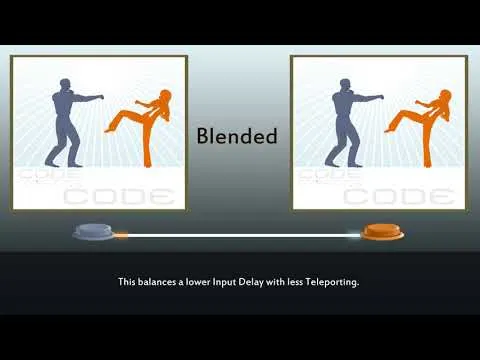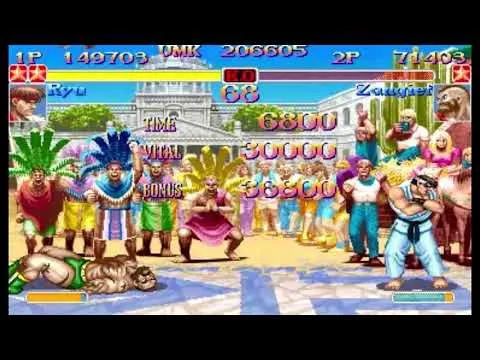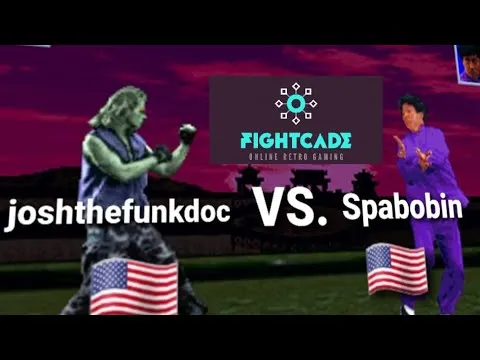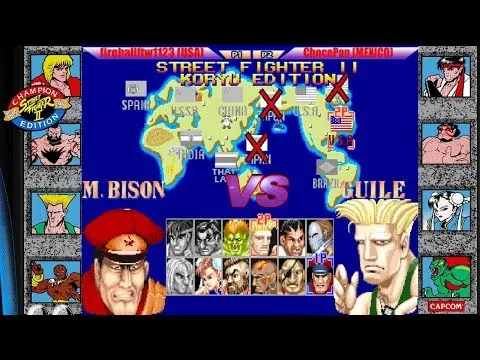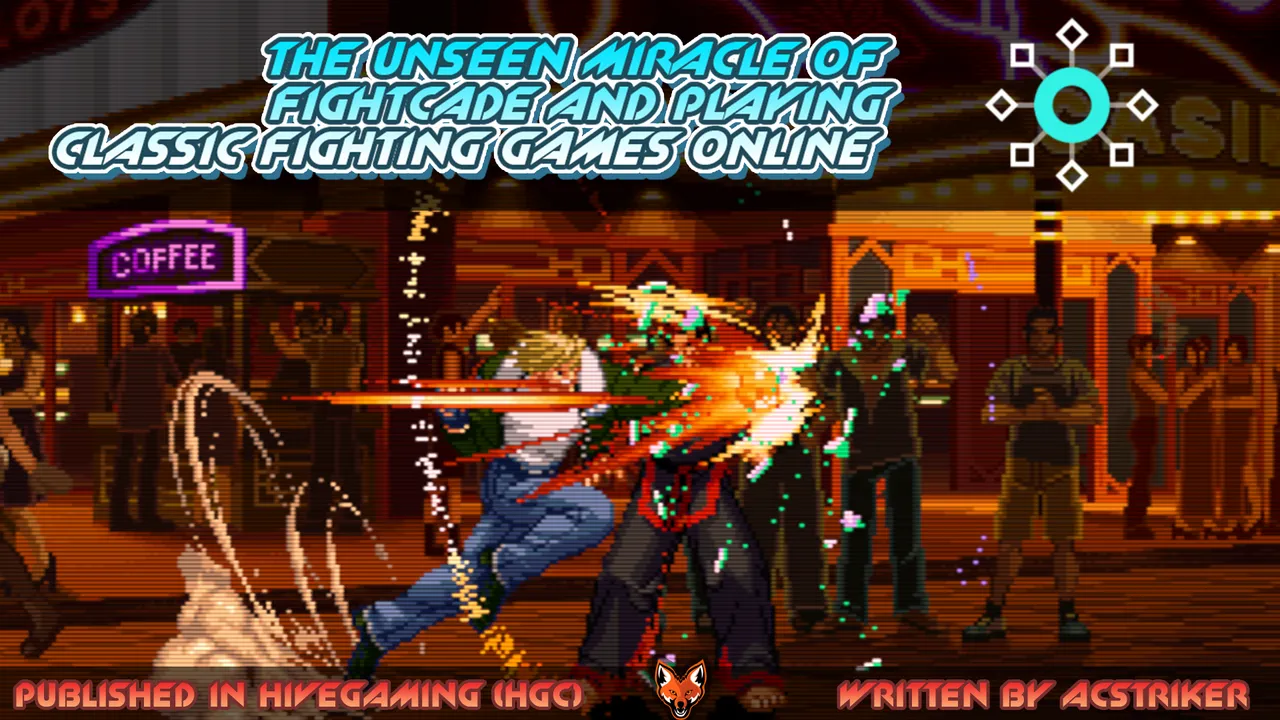
This article is avaliable in both English and Spanish (translated with DeepL). All screenshots captured by myself.
Este artículo esta disponible en ambos Inglés y Español (traducido con DeepL). Todas las fotos capturadas por mí.
English
Hello everyone! As internet here finally came back to being stable after months, I can finally start putting up again more creative posts (aside from my usual game shoutouts/reviews). Today I thought on writing about Fightcade, due to the fact that I had a long time since last time I played Street Fighter III Third Strike online (that game is one I will also discuss later on)...and then realized how wonderful is the fact that Fightcade exists.
If you are already familiar with this program, then you will probably understand how important it is in many ways for a lot of classic fighting game communities, but the main point of Fightcade is to play many games online with someone else through a special emulator. It is not all fighting games, but they are certainly the highlight as many of the platforms supported are known for them.
First I'll give some context about where Fightcade comes from in first place, then show not only why it works so well, but also how many games are given new life thanks to it.
History: GGPO's legacy and the need of a succesor
The story actually starts back in 2006 when Tony Cannon, an important name in FGC community as he founded both the EVO Championship Series tournaments and owned the fansite Shoryuken, released GGPO (which stands for Good Game, Peace Out). It was made as a response of a Street Fighter 2 re-release on Xbox 360 having poor netcode, as GGPO invented the famous "rollback netcode" through the use of savestates and analizing the player inputs. There's a proper explanation about rollback on the video below, but the point is that it definitely was a huge leap in quality.
Powered by the FinalBurn Alpha emulator, it supported games like Super Street Fighter 2 Turbo, The King of Fighters 98, Street Fighter Alpha 2 and 3, Third Strike, and so on. GGPO's client persisted until 2014, where there happened to be many shortages on the client's server, and then got discontinued...since there happend to be a better alternative on the works at that time.
Pau "Pof" Oliva was a main contributor behind Fightcade which started working on it back in that year between the shortages, and while it was supposed to be used only between his friends, it ended up getting quite developed and released that year. Since then, Fightcade only kept getting more and more players coming due to the many games supported, rock-solid stability and then 2017's huge update with a new UI and new platforms.
Oh, and GGPO's networking was turned into a middleware which ended up being used in many commercial games since 2008. Most notably, games like Skullgirls, Killer Instinct and Brawlhalla used this technology, and as GGPO's code went open source in 2019, this allowed for even more game developers to add both unofficial and official rollback to games. So it is fair to say that GGPO itself was instrumental to progress as it spawned an excellent netcode model, which would be carried over to Fightcade.
Fightcade features and support
The current incarnation of Fightcade runs a couple of emulators and platforms: Since the 2017 update, Fightcade not only has FinalBurn Neo (which is the newest incarnation of FBA) for most of the games supported before, but also has NullDC and Flycast for NAOMI arcade games, and Snes9X for Super Nintendo games. Most of the games supported in Fightcade are thanks to their boards being supported with FBN, like CPS2 (SF2, SFA3, Darkstalkers), CPS3 (SF3, Jojo), Neo-Geo (most SNK games) and so on.
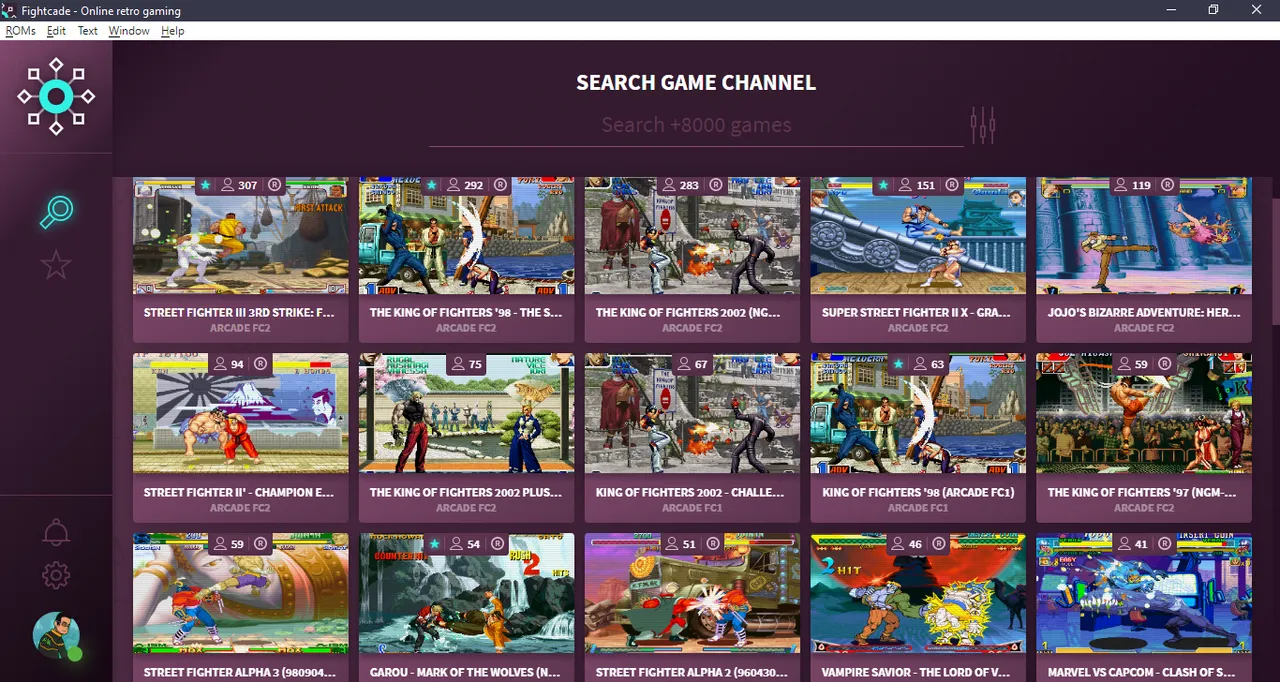
FBN-supported games run in the aforementioned rollback netcode, which was given an overhaul for the new Fightcade 2 update, but you can still find lobbies for "FC1 games", which use the classic rollback netcode and FBA emulator before the big update. While SNES and NAOMI (CVS2, MVC2) games don't support rollback as their emulators don't either, it is still nice that they are supported here with lobbies and everything.
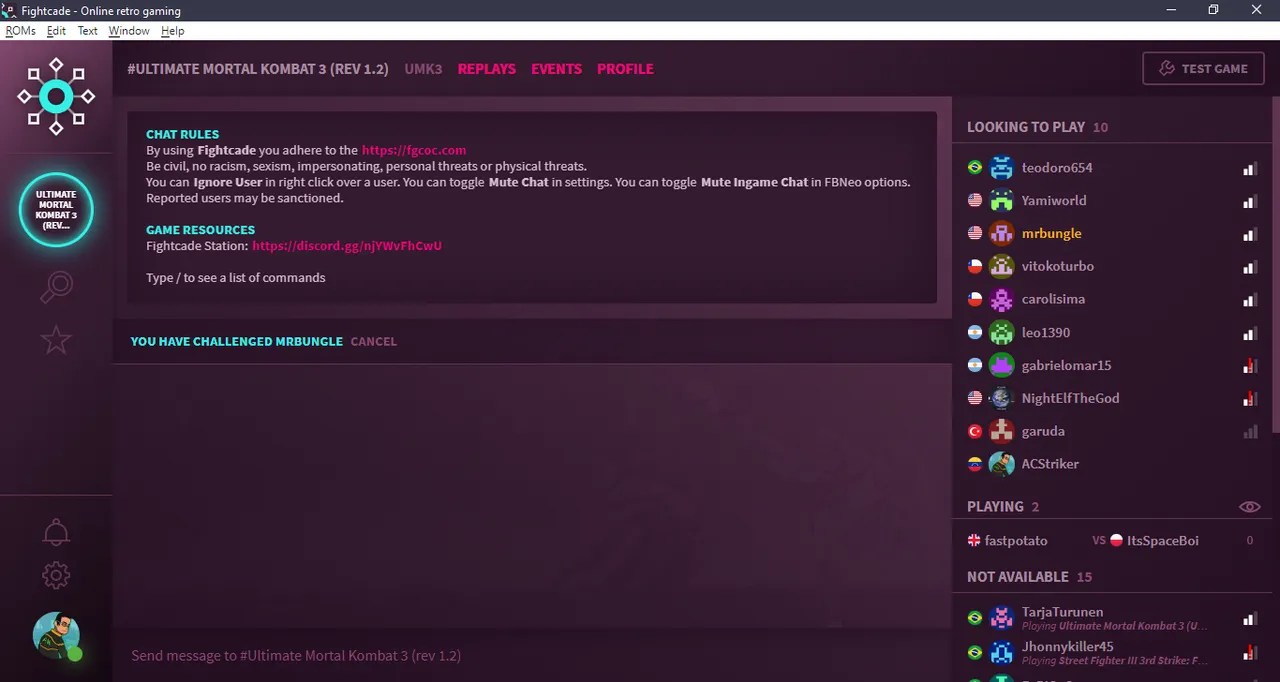
You can join a game lobby (currently up to 3 lobbies at a time) and talk with others, as well as challenge or being challenged by someone to play in whatever game the lobby is about. In certain games, there's support for Ranked matches (FT2, FT3, FT5 and FT10 as options), where you can get a rank in that lobby after several matches.
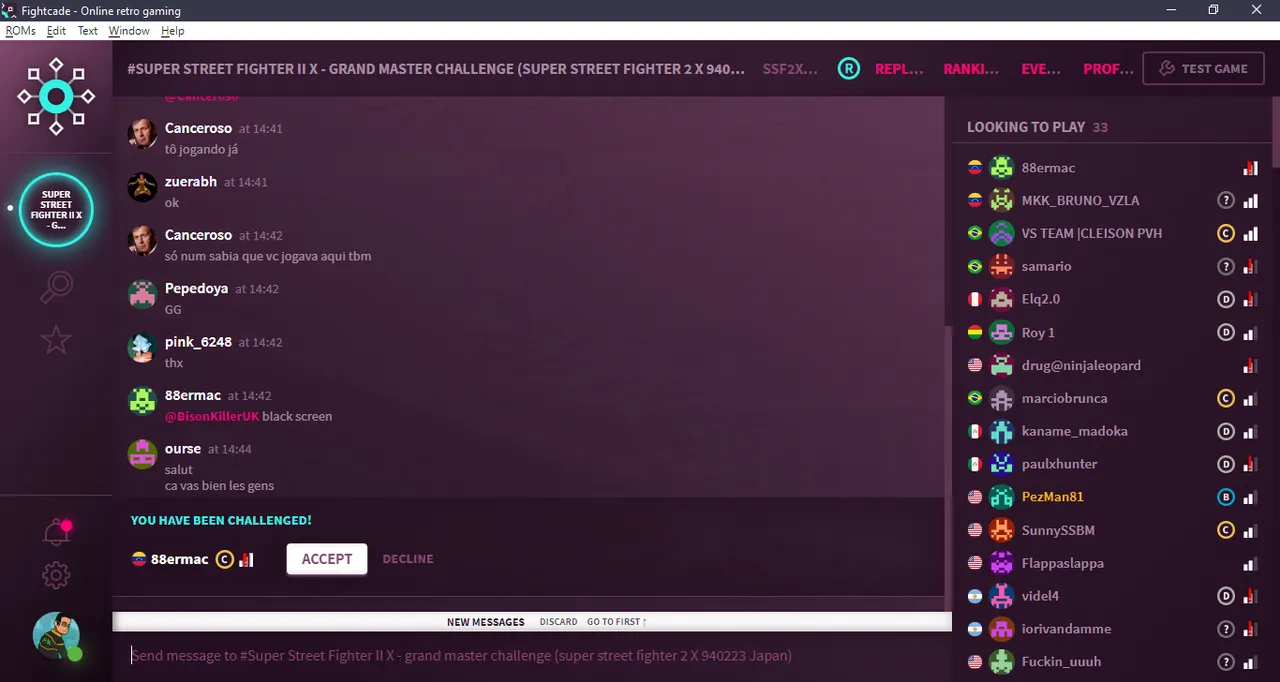
If you are playing a specific game for the first time, you will get the default controls (arrow keys, and ASDZXC for buttons), which you should change first with the "Test Game" button to launch the game offline and change the keys on the emulator (per-game in FBA/FBN, only once in Snes9X and NullDC/Flycast). And of course, since it acts like a emulator hub with online support, you have to find yourself those games.
Of course, as someone that always loved fighting games, I have played through a lot of 3rd Strike, Garou and KOF98 through here; almost every time the experience is quite great! However, I had mentioned it all wasn't strictly fighting games: Since it supports the platforms where they run themselves instead of specific games, puzzle games with versus modes (Magical Drop, Tetris TGM2TAP), coop games of any genre (TMNT Turtles in Time, Metal Slug) and other kind of games like Windjammers and Super Mario Kart are all avaliable.
Oh, and for most emulators, saving and sharing replays are supported, all through links that when opened, replay the game on the fly on your emulator. These are also always automatically saved on Fightcade's server, so you can always check your account to find a previous match.
How it contributed to communities and accesibility
With the use of ease that Fightcade provides and a friendly UI, it has been host for the life of many classic fighting games today, both legendary and unknown.
For example, you might have noticed in the "game list" screenshot that SF3 Third Strike and Super Turbo have a huge amount of players on their lobbies, despite the fact that these games are also avaliable to play online in Street Fighter 30th Anniversary Collection. This could be attributed to the freedom that Fightcade lobbies provide for picking games with friends and strangers, the lower hardware requeriments, and how it supports more than 4 games online.
The King of Fighters 98 and 2002 also show a lot of players, despite that their official UM remakes have online support (though only 2002UM has rollback at the moment). In a way, the fact that Fightcade is so convenient to open at any moment and hop in for matches really helps in this, and in any case there are countless other games that either don't have re-releases, or have but without online (at all or not good).
Small but dedicated communities for games like Breakers Revenge, Jackie Chan's Fists of Fire, Martial Masters and Samurai Showdown 3 wouldn't exist if they weren't playable in Fightcade due to their obscurity and the fact that they aren't really playable anywhere outside of emulation. Games like Darkstalkers, Jojo Bizarre Adventure, Neo Turf Masters, and Marvel VS Capcom also end up falling here despite being relatively well known (due to discontinued ports of lack of any).
Oh, and not only it also supports new romhacks like SSF2T New Legacy and SF3 4th Strike, but also weird bootlegs like KOF2002 Magic Plus and Street Fighter 2 Koryu/Rainbow Edition. So you can pick between updated versions by fans, or some of the weirdest hacks out there.
Conclusion
In the end, while Fightcade at its core is a lobby program for emulators with online support used to find other players, it has been essential in giving many communities a way to enjoy their games more as the lobby itself is useful for finding random games or with friends, and as most games are backed with rollback netcode, the already good fact of having online play is enhanced by a very good online experience (I could play Garou MOTW with someone from Japan flawlessly).
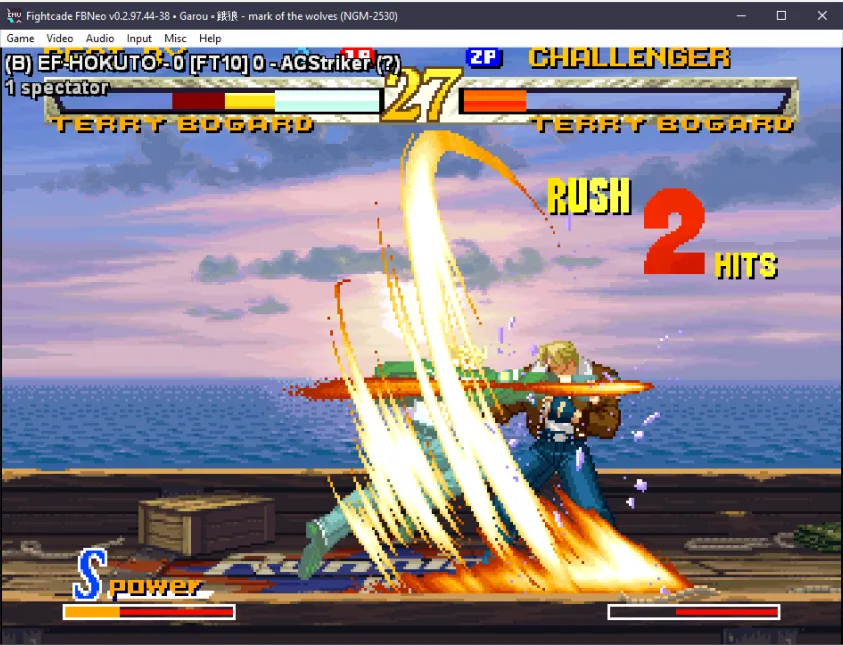
If you happen to spot a certain 2D fighting game classic you want to revisit again (or if I talk about it), there's a good chance that it is playable in Fightcade. While Fightcade itself is not really unknown to fighting game players as it is pretty clear that its used a lot for several games, it is still a miracle what it does for both preservation and enjoying these games up to this day by adding a sturdy online implementation. And of course, I want to give special thanks to the Fightcade staff for their continued support of this amazing service!
Español
¡Hola a todos! Como el internet aquí finalmente volvió a ser estable después de meses, por fin puedo empezar a poner de nuevo posts más creativos (aparte de mis habituales gritos/revisiones de juegos). Hoy pensé en escribir sobre Fightcade, ya que hacía mucho tiempo que no jugaba a Street Fighter III Third Strike online (juego del que también hablaré más adelante)... y entonces me di cuenta de lo maravilloso que es que exista Fightcade.
Si ya conoces este programa, entonces probablemente entenderás lo importante que es en muchos sentidos para muchas comunidades de juegos de lucha clásicos, pero el punto principal de Fightcade es jugar muchos juegos en línea con otra persona a través de un emulador especial. No son todos los juegos de lucha, pero sin duda son los más destacados, ya que muchas de las plataformas soportadas son conocidas por ellos.
Primero daré un poco de contexto sobre el origen de Fightcade en primer lugar, y luego mostraré no sólo por qué funciona tan bien, sino también cómo muchos juegos cobran nueva vida gracias a él.
Historia: El legado de GGPO y la necesidad de un sucesor
La historia comienza en 2006, cuando Tony Cannon, un nombre importante en la comunidad de la FGC, ya que fundó los torneos de la EVO Championship Series y era propietario del sitio de fans Shoryuken, lanzó GGPO (que significa Good Game, Peace Out). Se hizo como respuesta a una reedición de Street Fighter 2 en Xbox 360 que tenía un mal netcode, ya que GGPO inventó el famoso "rollback netcode" mediante el uso de savestates y el análisis de las entradas del jugador. Hay una explicación adecuada sobre el rollback en el vídeo de abajo, pero la cuestión es que definitivamente fue un gran salto de calidad.
Con el emulador FinalBurn Alpha, soportaba juegos como Super Street Fighter 2 Turbo, The King of Fighters 98, Street Fighter Alpha 2 y 3, Third Strike, etc. El cliente de GGPO perduró hasta 2014, donde se produjeron muchas carencias en el servidor del cliente, y luego se descontinuó... ya que había una mejor alternativa en funcionamiento en ese momento.
Pau "Pof" Oliva fue uno de los principales contribuyentes detrás de Fightcade que comenzó a trabajar en él en ese año entre la escasez, y aunque se suponía que era utilizado sólo entre sus amigos, terminó siendo bastante desarrollado y lanzado ese año. Desde entonces, Fightcade no ha hecho más que aumentar el número de jugadores gracias a la gran cantidad de juegos que admite, a su sólida estabilidad y a la enorme actualización de 2017 con una nueva interfaz de usuario y nuevas plataformas.
Ah, y la red de GGPO se convirtió en un middleware que acabó siendo utilizado en muchos juegos comerciales desde 2008. En particular, juegos como Skullgirls, Killer Instinct y Brawlhalla utilizaron esta tecnología, y como el código de GGPO pasó a ser de código abierto en 2019, esto permitió que aún más desarrolladores de juegos añadieran el rollback no oficial y oficial a los juegos. Así que es justo decir que el propio GGPO fue fundamental para el progreso, ya que engendró un excelente modelo de netcode, que se trasladaría a Fightcade.
Fightcade features and support
La encarnación actual de Fightcade ejecuta un par de emuladores y plataformas: Desde la actualización de 2017, Fightcade no solo cuenta con FinalBurn Neo (que es la encarnación más reciente de FBA) para la mayoría de los juegos soportados anteriormente, sino que también cuenta con NullDC y Flycast para los juegos arcade de NAOMI, y Snes9X para los juegos de Super Nintendo. La mayoría de los juegos soportados en Fightcade son gracias a que sus placas están soportadas con FBN, como CPS2 (SF2, SFA3, Darkstalkers), CPS3 (SF3, Jojo), Neo-Geo (la mayoría de los juegos de SNK), etc.

Los juegos compatibles con la FBN se ejecutan en el ya mencionado código de red rollback, que fue revisado para la nueva actualización de Fightcade 2, pero todavía se pueden encontrar lobbies para "juegos FC1", que utilizan el clásico código de red rollback y el emulador FBA antes de la gran actualización. Aunque los juegos de SNES y NAOMI (CVS2, MVC2) no soportan el rollback ya que sus emuladores tampoco lo hacen, sigue siendo agradable que estén soportados aquí con lobbies y todo.

Puedes unirte a un lobby de juegos (actualmente hasta 3 lobbies a la vez) y hablar con otros, así como desafiar o ser desafiado por alguien para jugar en cualquier juego del que se trate el lobby. En ciertos juegos, hay soporte para partidas clasificatorias (FT2, FT3, FT5 y FT10 como opciones), donde puedes conseguir un rango en ese lobby después de varias partidas.

Si es la primera vez que juegas a un juego concreto, tendrás los controles por defecto (teclas de flecha y ASDZXC para los botones), que deberás cambiar primero con el botón "Test Game" para lanzar el juego sin conexión y cambiar las teclas en el emulador (por juego en FBA/FBN, sólo una vez en Snes9X y NullDC/Flycast). Y por supuesto, ya que actúa como un emulador con soporte online, tienes que encontrar tú mismo esos juegos.
Por supuesto, como alguien a quien siempre le han gustado los juegos de lucha, he jugado un montón de 3rd Strike, Garou y KOF98 a través de aquí; ¡casi siempre la experiencia es bastante buena! Sin embargo, había mencionado que no todo eran juegos de lucha estrictamente: Ya que es compatible con las plataformas en las que se ejecutan ellos mismos en lugar de juegos específicos, juegos de puzzle con modos versus (Magical Drop, Tetris TGM2TAP), juegos coop de cualquier género (TMNT Turtles in Time, Metal Slug) y otro tipo de juegos como Windjammers y Super Mario Kart están todos disponibles.
Oh, y para la mayoría de los emuladores, guardar y compartir repeticiones está disponible, todo por links que cuando son abiertos, repiten el juego desde el mismo emulador. Estos también son guardados automáticamente en el servidor de Fightcade, asi que siempre puedes revisar tu cuenta para ver alguna partida previa.
Cómo ha contribuido a las comunidades y a la accesibilidad
Gracias a la facilidad que proporciona Fightcade y a una interfaz de usuario amigable, ha sido el anfitrión de la vida de muchos juegos de lucha clásicos actuales, tanto legendarios como desconocidos.
Por ejemplo, habrás notado en la captura de pantalla de la "lista de juegos" que SF3 Third Strike y Super Turbo tienen una gran cantidad de jugadores en sus vestíbulos, a pesar de que estos juegos también están disponibles para jugar online en Street Fighter 30th Anniversary Collection. Esto podría atribuirse a la libertad que ofrecen los lobbies de Fightcade para elegir partidas con amigos y desconocidos, a los menores requisitos de hardware y a que admite más de 4 partidas online.
Los King of Fighters 98 y 2002 también muestran una gran cantidad de jugadores, a pesar de que sus remakes oficiales en UM tienen soporte online (aunque sólo 2002UM tiene rollback por el momento). En cierto modo, el hecho de que Fightcade sea tan cómodo de abrir en cualquier momento y meterse en partidas ayuda mucho en esto, y en cualquier caso hay infinidad de otros juegos que o bien no tienen reediciones, o bien las tienen pero sin online (en absoluto o mal).
Las comunidades pequeñas pero dedicadas a juegos como Breakers Revenge, Jackie Chan's Fists of Fire, Martial Masters y Samurai Showdown 3 no existirían si no fueran jugables en Fightcade debido a su oscuridad y al hecho de que no son realmente jugables en ningún sitio fuera de la emulación. Juegos como Darkstalkers, Jojo Bizarre Adventure, Neo Turf Masters y Marvel VS Capcom también acaban cayendo aquí a pesar de ser relativamente conocidos (debido a los ports descatalogados o a la falta de ellos).
Ah, y no sólo soporta nuevos romhacks como SSF2T New Legacy y SF3 4th Strike, sino también extraños bootlegs como KOF2002 Magic Plus y Street Fighter 2 Koryu/Rainbow Edition. Así que puedes elegir entre versiones actualizadas por fans, o algunos de los hacks más extraños que hay.
Conclusión
Al final, aunque Fightcade en su esencia es un programa de lobby para emuladores con soporte online utilizado para encontrar a otros jugadores, ha sido esencial para dar a muchas comunidades una forma de disfrutar más de sus juegos ya que el lobby en sí es útil para encontrar partidas al azar o con amigos, y como la mayoría de los juegos están respaldados con netcode rollback, el hecho ya bueno de tener juego online se ve potenciado por una muy buena experiencia online (pude jugar a Garou MOTW con alguien de Japón sin problemas).

Si por casualidad ves un clásico de los juegos de lucha en 2D que quieres volver a visitar (o si hablo de él), es muy probable que se pueda jugar en Fightcade. Aunque Fightcade en sí no es realmente desconocido para los jugadores de juegos de lucha, ya que está bastante claro que se utiliza mucho para varios juegos, sigue siendo un milagro lo que hace tanto para la preservación como para el disfrute de estos juegos hasta el día de hoy al añadir una robusta implementación online. Y por supuesto, quiero dar agrdecimientos especiales al equipo de Fightcade por su soporte continuado de este gran servicio!

